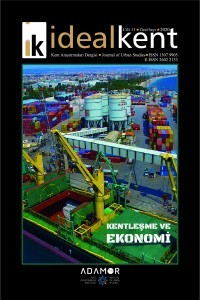
İDEALKENT
Yazarlar: Neslihan DEMİRTAŞ-MİLZ
Konular:-
Anahtar Kelimeler:Dubai,Filipino migrants,UAE migration policy,Kafala system,Remittances,Neoliberal city,Space,Urban closures,Exclusion/segregation
Özet: Everyday conditions of economic hardship and social exclusion produce strong feelings of isolation from city space for low-level construction/service workers in Dubai. On the other hand, the professional upper-middle classes seem to transcend their expatriate/outsider (migrant) position as they embrace advantages of fully integrating with city’s spaces of consumption and their participation in broader civic life. In-between these two polar migrant experiences with integration, is situated is situated a third one, which has not been elaborated in detail in the literature. The conditions of young Filipino migrants who are university/college graduates and who have strong international communicational skills are situated in this very broad and heterogeneous category. This paper draws upon a research that was conducted in 2011 on young migrants (between ages 20-30) from Philippines with such qualities who are working in the shopping malls of Dubai as sales personnel. Within the framework of the research, I conducted 30 in-depth interviews. The main quest of the research was to understand how these migrants socio-spatially relate themselves with the city space and perceive the opportunities and limitations of living and working in Dubai. As the research findings denote, despite their individual qualities and possibilities of socio-spatial integration, these young people carry on very isolated and restricted lives (almost a “forced Filipino diaspora”). It is possible to situate this problem at the intersection of ethnically based migration policy of UAE, the repercussions of Philippines’ migration industry and urban closures due to neoliberal city structuring.